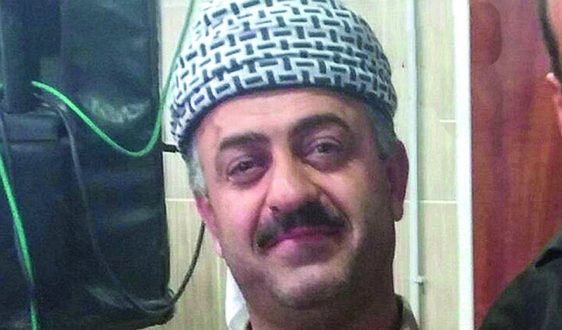Iran Human Rights (IHRNGO) – Kurdish political prisoner, Heydar Ghorbani who was sentenced to death on charges of baghy (armed rebellion), has been executed in Sanandaj Central Prison while according to his lawyer, Heydar “never confessed to being armed or using a weapon and there is no evidence to suggest otherwise.” Heydar was executed without notice to his family and lawyer, and his body was secretly buried. His execution was carried out while his case was still under consideration at the Supreme Court according to Article 477 of the CCP.
Iran Human Rights condemns Heydar Ghorbani’s execution in the strongest terms. Director Mahmood Amiry-Moghaddam said: “As well as the death penalty being a cruel and inhumane punishment, Heydar Ghorbani was subjected to torture and sentenced to death without due process and any evidence against him.”
“Heydar’s death penalty is unlawful even under the Islamic Republic’s own laws. Such executions are carried out to instil fear in society to counter the growing dissatisfaction with the incompetent Islamic Republic rulers,” he added.
Heydar Ghorbani was executed on 19 December 2021 while his case was still under consideration at the Supreme Court according to Article 477 of the Code of Criminal Procedure. Heydar’s lawyer, Saleh Nikbakht told Iran Human Rights: “His request under Article 477 was still under review. According to a conversation I had with Heydar at 7pm yesterday, his last request was submitted to the Head of Judiciary, who had sent it to the provincial head of judiciary, stating that it should be reviewed and its results sent to me (Head of Judiciary) and his family. When his family followed up with the provincial head of judiciary’s office, a person named Mr Hosseini told them to not worry and that he had received the letter from the Head of Judiciary. However, unfortunately eight hours after speaking to me, he was executed at 4 o’clock this morning.”
One of Heydar’s relatives told Iran Human Rights: “They told us to come and visit Heydar, we want to transfer him to Tehran for his Article 477 proceedings. They were lying and executed him this morning. They took us and showed us a grave that they said is Heydar. They buried him in Beheshte Mohammadi cemetery themselves and didn’t give us his body.”
Article 477 of the Code of Criminal Procedure: “Should the Head of Judiciary find any decisions made by judicial authorities contrary to Sharia, he shall request a retrial and send the case to the Supreme Court for consideration and a final decision at a special branch assigned by the Head of Judiciary. Should the aforementioned special branches find any contraventions with Sharia, the former decision will be void and they shall reconsider the case both in form and substance, and issue an appropriate decision.”
Saleh Nikbakht previously told Iran Human Rights: “While Heydar also has a case in the Criminal Court which has sentenced him to 90 years altogether, he has been sentenced to death by the Sanandaj Revolutionary Court on charges of baghy, which has now been upheld. The baghy charge requires that the defendant be a member of an armed group and to have used a weapon against the Islamic Republic, which Heydar has not confessed to either, even under torture, and there was no evidence in the case other than the claims made by the Sanandaj and Kamyaran intelligence agencies.”
According to the Supreme Court judgement which has been seen by Iran Human Rights, Heydar Ghorbani was the fifth defendant in a five-person case whose main defendants have not yet been arrested.
Speaking to Iran Human Rights, one of his relatives said: “He spent more than a year in the custody of the Ministry of Intelligence and the IRGC Intelligence Organisation, three months of which were spent in solitary confinement. After months of interrogations and torture by the Ministry of Intelligence, they aired his forced confessions on Press TV in March 2017. All the confessions were pure lies extracted under torture.”
“The day we saw him, his hands were shaking and he said ‘they tortured me a lot and I was forced to confess using different methods of physical torture, all the aired confessions were forced and given under torture,’” he added.
Heydar Ghorbani was born in 1973 and is from the village of Bezush in Kamyaran city. On 11 October 2016, he was arrested by security forces along with Mahmoud Sadeghi while on his way home from work. Heydar’s brother in law, Mahmoud Sadeghi is the other defendant in the case.
Heydar Ghorbani’s case was sent to the Kamyaran Court a year after his arrest, but Kamyaran Court referred the case to the Sanandaj Court after recusing themselves from the case. In October 2019, Heydar Ghorbani was sentenced to 30 years imprisonment by Branch One of the Sanandaj Criminal Court on the charge of “complicity in premeditated murder.”
However, he was given the death penalty in a case opened against him by Branch One of the Sanandaj Revolutionary Court for charges of “baghy and membership in the Kurdistan Democratic Party of Iran.” His sentence was upheld by Branch 27 of the Supreme Court on 5 August 2020 and sent for implementation. Heydar’s request for retrial was rejected within three weeks of submission on September 9 by Branch 9 of the Supreme Court. He had then made his request under Article 477 which was still under consideration, making his execution unlawful according to the Islamic Republic’s rules.
 Shabtabnews In this dark night, I have lost my way – Arise from a corner, oh you the star of guidance.
Shabtabnews In this dark night, I have lost my way – Arise from a corner, oh you the star of guidance.



